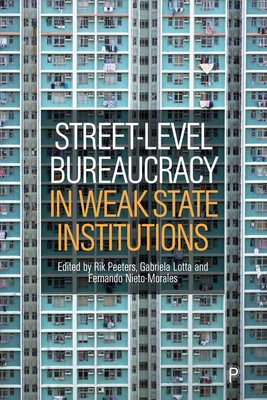What laws formally guarantee, politicians promise and public policies aim to achieve needs to be materialised in our daily interactions with public organisations.
There, we often encounter street-level bureaucrats or front-line workers who process our applications for a social benefit, provide access to public services such as health care or education, and enforce traffic and safety regulations.
They do not simply apply formal rules to individual cases. Instead, the hospital’s emergency staff decide which patients to attend to first, police officers on the street decide whom to pull over and how to treat each specific case, and social workers negotiate with their clients about treatment plans. Although the specific organisational and work context matters, street-level bureaucrats always have some form of discretion in the way they interpret, apply or bend the rules and deal with citizens.
Most studies on street-level bureaucracy come from the Global North, from contexts where bureaucracies are usually well staffed and funded and work within a strong legal tradition. But what happens in contexts where such resources and conditions are not provided or are simply non-existent? For example, in many places, nurses and physicians face a lack of basic materials to provide health care. Police officers are expected to enforce rules in violent urban contexts or remote rural areas controlled by organised criminals. Desk clerks have to make decisions in the absence of clear formal guidelines. And social workers lack the means to attend to the problems of highly marginalised communities.
Institutional characteristics, such as low trust by citizens in governments, limited capacities to cover the demand for public services, and the intervention of political interests in street-level organisations shape the working conditions and, consequently, the incentives and constraints for front-line work behaviour. More specifically, institutional deficiencies are often left unresolved and subsequently pushed towards the street level, where public servants deal with them in highly diverse ways. They often have to cope with situations where what is expected from them far exceeds the resources they have at hand to do their job.
In response, street-level bureaucrats may improvise practical solutions, spend their own time and resources on buying essential materials, provide mutual support among colleagues, and develop practical knowledge to foresee possible implementation challenges in the future. However, there are serious limitations to the extent to which street-level bureaucrats can repair structural deficiencies. Moreover, front-line workers may also primarily respond to their own survival needs by rationing services and distancing themselves from citizens/clients. Unappreciated by citizens, ignored by politicians and managers, exposed to danger, and subjected to precarious working conditions – often amplified by a lack of job security, limited career possibilities, and low income – many front-line workers in weak institutional settings are left to fend for themselves.
For instance, in their efforts to keep a hospital running, medical staff turn to strict rationing of patient attention and differentiating between easy and difficult patients. Likewise, desk clerks favour specific clients over others and sometimes send away the ones without the proper documentation to prove eligibility for health insurance. In doing so, front-line workers create inequities in citizens’ access to healthcare. There is an inevitability of implementing inequities in service delivery, treatment of citizen–clients, and law enforcement as the defining characteristic of street-level bureaucracy in weak institutional settings – not necessarily because they resort to predatory behaviour but primarily because street-level bureaucrats lack the institutional resources to do otherwise.
Unsurprisingly, front-line workers may have tense interactions with citizens or there may be more constructive forms of interaction between street-level bureaucrats and citizens. Especially when they are embedded in the communities they serve, street-level bureaucrats can find ways to champion vulnerable citizens with limited capacities to obtain access to state services and benefits.
This emerges as an interesting strategy for places and countries with institutional deficiencies in their formal bureaucracies, unable to reach out to vulnerable communities and reduce the burdens they experience in accessing the state. These brokering and relational strategies appear particularly attractive for rural and marginalised territories, where formal bureaucracy has a limited reach, and communal ties are usually close and thick. Rather than seeing this as fundamentally deficient from the perspective of sturdy Weberian bureaucracies, organising front-line capacities for resilience, relation-building, negotiation and brokerage may be a valuable strategy to compensate for some, but not all, elements of institutional deficiencies common in most of the world.
Rik Peeters is Associate Professor of Public Administration at the Center for Research and Teaching in Economics (CIDE). Gabriela Lotta is Associate Professor of Public Administration at Fundação Getulio Vargas (FGV). Fernando Nieto-Morales is Associate Professor of Public Administration at El Colegio de México.
 Street-Level Bureaucracy in Weak State Institutions edited by Rik Peeters, Gabriela Lotta and Fernando Nieto-Morales is available here on Bristol University Press for £80.00. Or order the EPUB for £27.99.
Street-Level Bureaucracy in Weak State Institutions edited by Rik Peeters, Gabriela Lotta and Fernando Nieto-Morales is available here on Bristol University Press for £80.00. Or order the EPUB for £27.99.
Bristol University Press/Policy Press newsletter subscribers receive a 25% discount – sign up here.
Follow Transforming Society so we can let you know when new articles publish.
The views and opinions expressed on this blog site are solely those of the original blog post authors and other contributors. These views and opinions do not necessarily represent those of the Policy Press and/or any/all contributors to this site.
Image AsianDream via iStock


